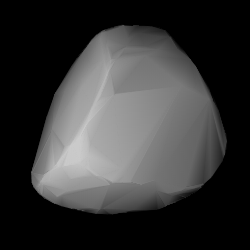Astronomy:626 Notburga
From HandWiki
 Modelled shape of Notburga from its lightcurve | |
| Discovery | |
|---|---|
| Discovered by | August Kopff |
| Discovery site | Heidelberg |
| Discovery date | 11 February 1907 |
| Designations | |
| (626) Notburga | |
| Pronunciation | /nɒtˈbɜːrɡə/ |
| Named after | Saint Notburga |
| 1907 XO | |
| Orbital characteristics[1] | |
| Epoch 31 July 2016 (JD 2457600.5) | |
| Uncertainty parameter 0 | |
| Observation arc | 109.14 yr (39863 d) |
| |{{{apsis}}}|helion}} | 3.1985 astronomical unit|AU (478.49 Gm) |
| |{{{apsis}}}|helion}} | 1.9481 AU (291.43 Gm) |
| 2.5733 AU (384.96 Gm) | |
| Eccentricity | 0.24295 |
| Orbital period | 4.13 yr (1507.8 d) |
| Mean anomaly | 277.12° |
| Mean motion | 0° 14m 19.536s / day |
| Inclination | 25.371° |
| Longitude of ascending node | 341.645° |
| 43.678° | |
| Physical characteristics | |
| Mean radius | 50.365±1 km[1] 48.42 ± 2.335 km[2] |
| Mass | (3.24 ± 1.30) × 1018 kg[2] |
| Mean density | 6.81 ± 2.90 g/cm3[2] |
| Rotation period | 19.353 h (0.8064 d) |
| Geometric albedo | 0.0437±0.002 |
| Absolute magnitude (H) | 9.00 |
626 Notburga is a large, dark asteroid orbiting the Sun in the asteroid belt.[1]
References
- ↑ 1.0 1.1 1.2 "JPL Small-Body Database Browser: 626 Notburga(1907 XO)". https://ssd.jpl.nasa.gov/sbdb.cgi?sstr=626.
- ↑ 2.0 2.1 2.2 Carry, B. (December 2012), "Density of asteroids", Planetary and Space Science 73: pp. 98–118, doi:10.1016/j.pss.2012.03.009, Bibcode: 2012P&SS...73...98C. See Table 1.
External links
- 626 Notburga at AstDyS-2, Asteroids—Dynamic Site
- 626 Notburga at the JPL Small-Body Database
 |
